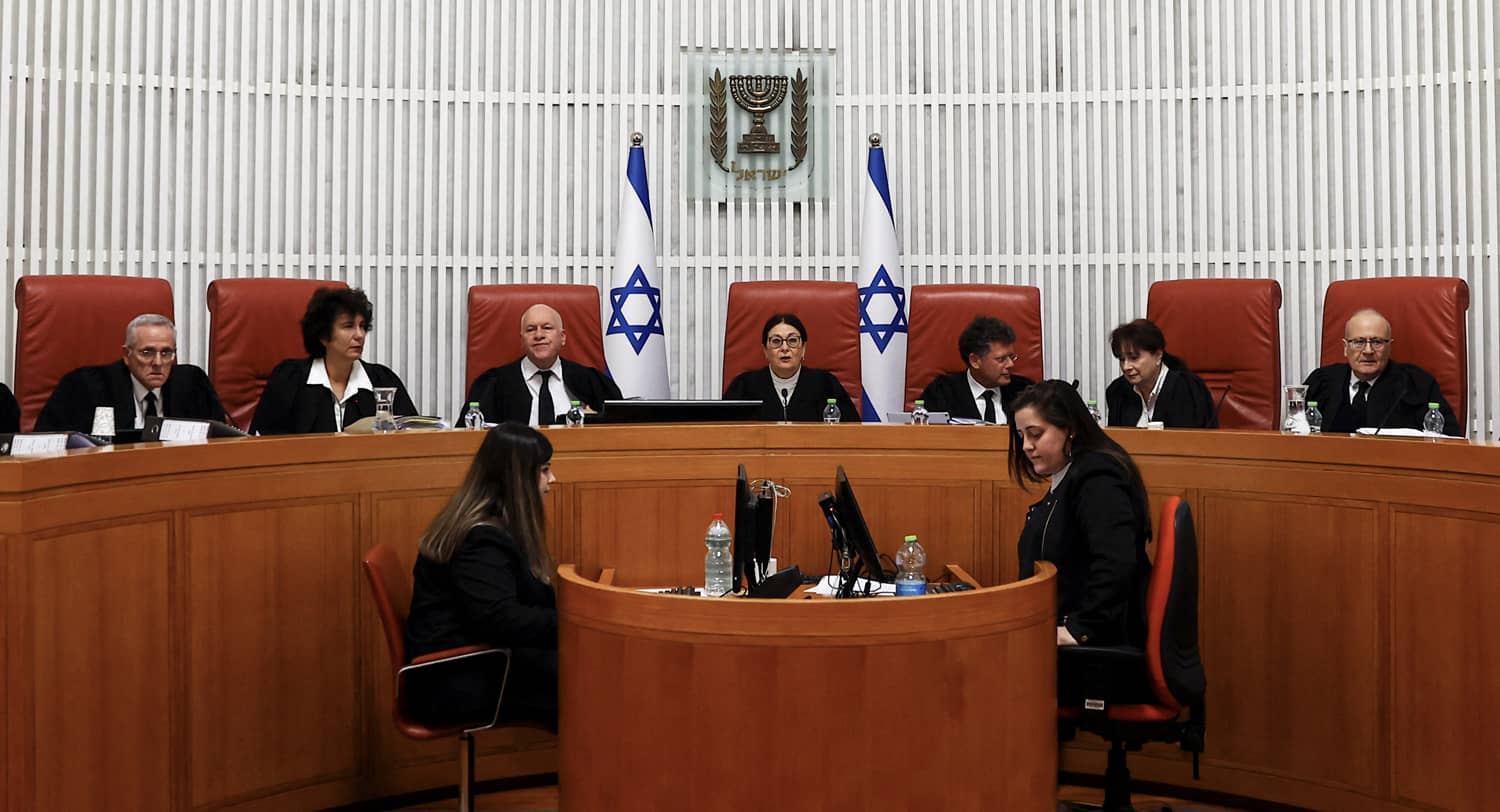On September 12, Israel’s Supreme Court will convene in an atmosphere of heightened political tension to listen to petitions asking it to strike down a recently-passed Knesset law. No decision from the Court is expected imminently as Israel enters a month of High Holy Days. But political compromise proposals by the Prime Minister and others indicate a growing concern with leaving the matter in the hands of the Court.
Part of the new Israeli government’s judicial reforms (and the only element enacted thus far), this law would bar judges from using the “reasonableness standard,” a defined principle in Israeli jurisprudence with established criteria, and one previously used to overrule as “unreasonable” both legislation and certain kinds of executive actions. Both sides have taken to the streets to argue for or against these laws’ effects on Israel’s democracy. What may seem like dry material for a law review article on justiciability to outsiders is a hot-button political debate inside the country. Yet there is a solution available to the Court that allows both sides to win in a way that also strengthens Israel’s democracy.
Israel’s Marbury v. Madison Moment
— Chief Justice Marshall in Marbury v. Madison, 5 U.S. at 177
Israel is not the first democracy to face a political crisis over a supreme court’s ability to review and strike down legislation. The United States, the world’s oldest democracy, faced just such a crisis in the second generation after its founding, in the case of Marbury v. Madison (1805).
The story behind the Marbury case illuminates a court’s ability to establish its supremacy in interpreting the law, while at the same time limiting itself vis-à-vis the political branches of government. Thus it’s worthwhile to tell the story behind the Marbury case.
On 4 March 1801, Thomas Jefferson was inaugurated as the third President of the United States after a bitterly contentious election. Two days before, outgoing president John Adams, Jefferson’s opponent in the race, had appointed nearly 60 of his supporters to federal positions and, on its last day in office, the outgoing Congress had confirmed the appointments en masse.
Jefferson refused to recognize these last-minute appointments, relying on the technicality that some of the commission documents had not been delivered to the appointees before the turn-over of administration on March 4. One of these was for the Maryland financier William Marbury to become a justice of the peace (a low-level judge) for the District of Columbia.
Marbury then sued Jefferson’s Secretary of State James Madison to force the new administration to honor his appointment (at the time, part of the Secretary of State’s job was to impress the Great Seal of State on official documents and have them delivered to the intended recipients).
In Marbury v. Madison, the new Chief Justice John Marshall took on a politicized, bitterly personal case. He also had been appointed to the judiciary by President Adams; in his prior job as Adams’ Secretary of State Marshall had sealed the very Marbury commission whose validity was in dispute. Furthermore, Marshall and Jefferson were first cousins from Virginia and political rivals (Marshall had called Jefferson a shirker for sitting out the Revolutionary War in Paris on a diplomatic assignment.) Jefferson and Marshall had radically different visions for the future of this new country.
Marshall’s opinion of the court in Marbury was Solomonic. On the petition to allow Mr. Marbury to serve as a justice of the peace by having his commission delivered to him, Marshall ruled for the Jefferson administration. The Supreme Court didn’t have the authority to force an executive branch employee – Secretary of State Madison – to deliver the commission and swear in Mr. Marbury.
In ruling for Jefferson, Marshall also declared that a provision of the congressional law which set up the federal court system – and which gave Marbury the jurisdictional basis for his petition to the Supreme Court – was unconstitutional and invalid. Marshall thus asserted the Court’s right to strike down (or uphold) acts of the other two branches of government that were contrary to the US constitution, a right that is nowhere found in the constitution itself.
Jefferson was not happy with this outcome. Though he had won the battle to prevent the last-minute appointments of Adams, Jefferson lost to Marshall on the larger principle of the judiciary’s right to review the political branches’ acts on grounds of constitutionality. That right may seem natural to us now, but it wasn’t so at the time. Jefferson after all had drafted the Declaration of Independence. He thought of the constitution as mainly a political document like the Declaration, and denied that the courts should have a monopoly on interpreting either one.
Marshall had established in Marbury what was later called the principle of judicial review. His holding is worth examining again in light of Israel’s debate.

Israel’s Lack of a Constitution Is Not Decisive
Marshall had a written constitution to rely on in establishing judicial supremacy in Marbury v. Madison. Israel doesn’t have a constitution but only a series of Basic Laws addressing certain rights and governmental functions, each passed by the Knesset by simple majority vote, that are endowed with vague, quasi-constitutional status.
Some analysts in Israel believe the solution is a constitutional process, in which the political parties in the Knesset would take their time in drafting and adopting a document by a super-majority that would decide, among other issues, the parameters of judicial review. In fact, back in January I also recommended this solution. Certainly such a process would be more credible and democratic than the “experts commission” appointed by President Yitzhak Herzog.
After studying the history of Israel’s attempts to draw up a constitution, however, I have concluded it isn’t going to happen in the near term.
Here’s some background: Israel’s declaration of independence of May 1948 envisions a “constitution to be drawn up by a constituent assembly” and early Knesset sessions in 1950-52 addressed the issue. The main advocate for a constitution was rightwing opposition leader Menachem Begin who saw it as protection for the rights of the minority political parties and minority groups more generally. The constitution’s chief opponent was David Ben Gurion, first prime minister and leader of the center-left Labor Party, who saw a constitution as infringing on the democratic rights of the majority.
Though these political positions are today reversed – with the Left now calling for a constitution and the Right now opposing – there is one constant element. The Orthodox religious parties, often the king-maker in Israeli governing coalitions, have uniformly opposed a constitution both then and now. For them, a Jewish state should have only one constitution, the Torah.
Until such time as some widely respected Orthodox rabbis in Israel espouse a theology that allows for a secular constitution in a majority Jewish state (halachic precedents may exist), Israelis should expect the religious parties to continue to unite in opposition to a constitutional process. So it isn’t going to happen.
Nor is a constitution necessary to resolve the current debate (though it would be helpful). Israel’s Basic Law on the Judiciary of 1984 doesn’t address the concept of judicial review, but then neither does the US constitution. Israel’s supreme court established the general principle of judicial review of legislation back in 1995 (in the United Mizrahi Bank case). It has yet to be applied in cases involving the Basic Law on the Judiciary, like the case on September 12 (and importantly, in future cases if other aspects of the government’s judicial reforms are passed into law).
In Marbury, Marshall found judicial review of legislative rules inherent in the “province and duty” of the judiciary. As he explained:
“Those who apply the rule to particular cases, must of necessity expound and interpret that rule.”

Israel’s Marshallian Solution
Israel’s Supreme Court has before it two major issues in the petitions to strike down the reasonableness law. First, should this controversial Knesset law be upheld as legal or should it be struck down? Second, can the Supreme Court even review this kind of law, which is an amendment to the Basic Law on the Judiciary?
The Marshallian solution would first uphold the Knesset law which bars use of the reasonableness standard, thus giving the government a political win on the narrow issue. But on the second issue, Marshallian logic would reaffirm the key principle of the judiciary’s supremacy in reviewing and potentially striking down any law passed by the Knesset, including a Basic Law, including the Basic Law on the Judiciary. This would serve as a warning on the potential future of other elements of the government’s judicial reforms, if they are passed into law.
The judicial review principle is critical to the independence of Israel’s judiciary. But a specific judicial review standard is not, especially one vulnerable to criticism on grounds of subjectivity like “reasonableness.” Using judicial review to uphold rather than strike down a government proposal would be an elegant way of allowing both sides to win in this debate.
Elegant Supreme Court decisions may not completely quell the political partisans in Israel, who have latched onto the government’s judicial reforms as a talisman for wider social concerns, but that would be the subject of another article. Marshall didn’t solve all of the crises in early America, though he did strengthen the judiciary while outwitting Jefferson in Marbury v. Madison.

